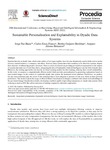| dc.contributor.author | Paz Ruza, Jorge | |
| dc.contributor.author | Eiras-Franco, Carlos | |
| dc.contributor.author | Guijarro-Berdiñas, Bertha | |
| dc.contributor.author | Alonso-Betanzos, Amparo | |
| dc.date.accessioned | 2023-01-09T12:43:04Z | |
| dc.date.available | 2023-01-09T12:43:04Z | |
| dc.date.issued | 2022 | |
| dc.identifier.citation | J. Paz-Ruza, C. Eiras-Franco, B. Guijarro-Berdiñas and A. Alonso-Betanzos, "Sustainable Personalisation and Explainability in Dyadic Data Systems," in 26th International Conference on Knowledge-Based and Intelligent Information & Engineering Systems (KES 2022), Procedia Computer Science, vol. 207, pp. 1017-1026, 2022. DOI: 10.1016/j.procs.2022.09.157 | es_ES |
| dc.identifier.uri | http://hdl.handle.net/2183/32304 | |
| dc.description.abstract | [Abstract]: Systems that rely on dyadic data, which relate entities of two types together, have become ubiquitously used in fields such as media services, tourism business, e-commerce, and others. However, these systems have had a tendency to be black-box systems, despite their objective of influencing people's decisions. There is a lack of research on providing personalised explanations to the outputs of systems that make use of such data, that is, integrating the idea of Explainable Artificial Intelligence into the field of dyadic data. Moreover, the existing approaches rely heavily on Deep Learning models for their training, reducing their overall sustainability. In this work, we propose a computationally efficient model which provides personalisation by generating explanations based on user-created images. In the context of a particular dyadic data system, the restaurant review platform TripAdvisor, we predict, for any (user, restaurant) pair, the review of the restaurant that is most adequate to present it to the user, based on their personal preferences. This model exploits the usage of efficient Matrix Factorisation techniques combined with feature-rich embeddings of the pre-trained Image Classification models, developing a method capable of providing transparency to dyadic data systems while reducing as much as 80% the carbon emissions of training compared to alternative approaches. | es_ES |
| dc.language.iso | eng | es_ES |
| dc.relation.uri | https://doi.org/10.1016/j.procs.2022.09.157 | es_ES |
| dc.rights | Atribución-NoComercial-SinDerivadas 4.0 Internacional | es_ES |
| dc.rights.uri | http://creativecommons.org/licenses/by-nc-nd/3.0/es/ | * |
| dc.subject | Dyadic Data | es_ES |
| dc.subject | Explainable Artificial Intelligence | es_ES |
| dc.subject | Image Classification | es_ES |
| dc.subject | Image-based personalisation | es_ES |
| dc.subject | Matrix Factorisation | es_ES |
| dc.title | Sustainable personalisation and explainability in Dyadic Data Systems | es_ES |
| dc.type | info:eu-repo/semantics/conferenceObject | es_ES |
| dc.rights.access | info:eu-repo/semantics/openAccess | es_ES |
| UDC.journalTitle | Procedia Computer Science | es_ES |
| UDC.volume | 207 | es_ES |
| UDC.startPage | 1017 | es_ES |
| UDC.endPage | 1026 | es_ES |
| dc.identifier.doi | 10.1016/j.procs.2022.09.157 | |






